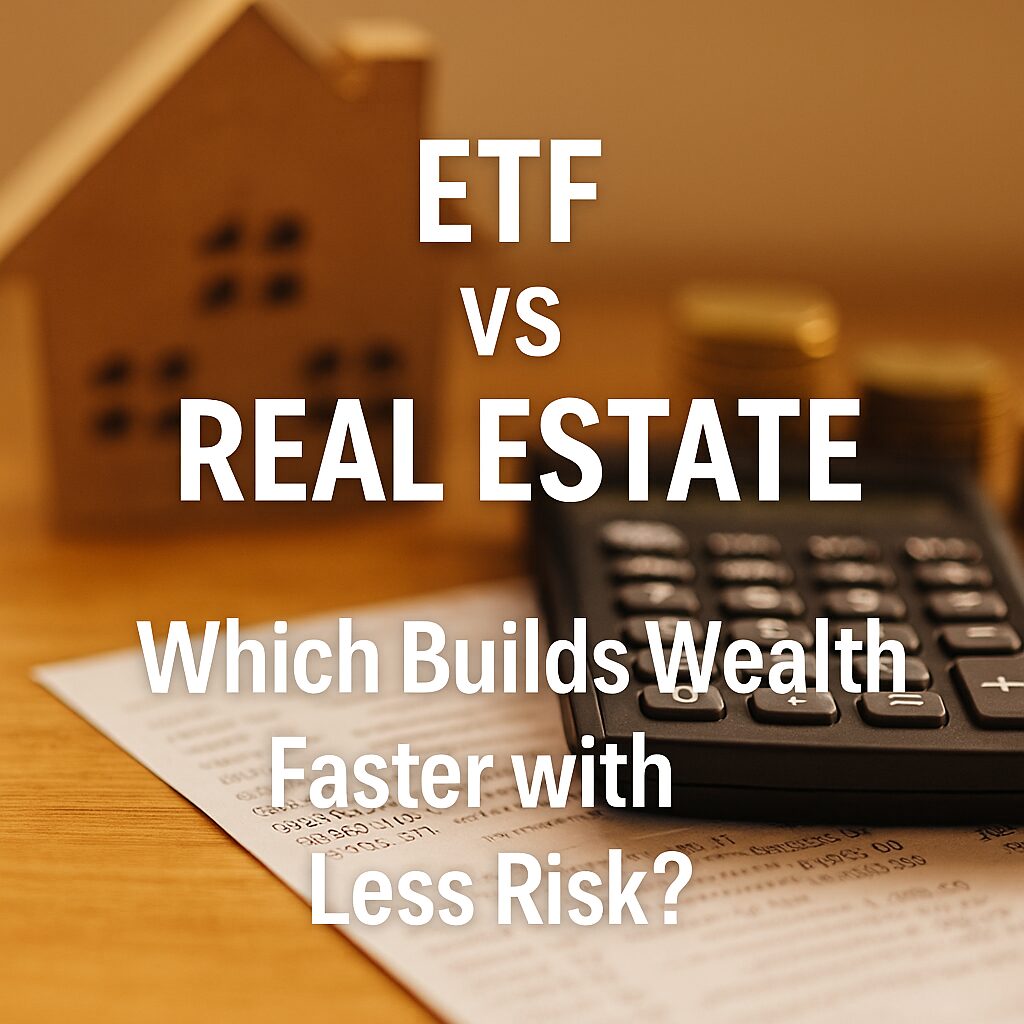Introduction
If you’re trying to decide where to put your money in 2025—into dividend-paying ETFs or real estate—you’re not alone. With global markets shifting, interest rates fluctuating, and housing affordability becoming more complex, investors want clarity. This article dives deep into both options and evaluates which one helps build wealth faster, and with less risk, in today’s economic climate.
What We Mean by ‘Building Wealth’
Wealth-building isn’t just about appreciation. It’s about:
- Consistent cash flow
- Asset appreciation
- Tax advantages
- Low maintenance
- Liquidity
In this article, we evaluate ETFs and real estate across all five dimensions.
1. Initial Capital Required
ETF
- You can start with as little as $100.
- Commission-free trading platforms (e.g., Fidelity, Charles Schwab) allow dollar-cost averaging.
- Fractional shares are available.
Real Estate
- Requires high upfront costs: down payment, closing costs, inspections, etc.
- Average U.S. down payment: $30,000–$60,000+
- Limited liquidity.
Verdict: ETFs are significantly more accessible for beginner investors.
2. Monthly Cash Flow
ETF
- High-dividend ETFs like JEPI, VYM, and SCHD can yield 4–8% annually.
- Paid monthly or quarterly.
- Can be reinvested automatically.
Real Estate
- Rental income can be steady but is often offset by:
- Maintenance
- Vacancy periods
- Property taxes and management fees
Verdict: ETFs provide predictable, hands-off cash flow. Real estate requires active management.
3. Risk Profile
ETF
- Subject to market volatility.
- However, ETFs are diversified and highly liquid.
- No tenant issues, repair costs, or legal liabilities.
Real Estate
- Property value depends on location, economy, and demand.
- Vulnerable to damage, tenant risk, market downturns.
Verdict: ETFs are lower risk in terms of management and diversification.
4. Tax Efficiency
ETF
- Qualified dividends taxed at lower capital gains rates.
- Favorable if held in Roth IRA or tax-advantaged accounts.
Real Estate
- Mortgage interest, depreciation, and expenses are tax-deductible.
- Long-term capital gains and 1031 exchanges can defer taxes.
Verdict: Real estate offers deeper tax deductions, but ETFs win in simplicity and hands-off benefits.
5. Liquidity & Flexibility
ETF
- Can sell any time during market hours.
- Easily rebalanced.
Real Estate
- Property sales can take weeks or months.
- Difficult to access equity without refinancing.
Verdict: ETFs are far more flexible and liquid.
6. Long-Term Performance (Case Study)
ETF Portfolio: SCHD + VYM + JEPI
- $100K invested in 2013 = ~$250K by 2023
- Annualized return: ~9% with dividends reinvested
Real Estate: $100K Property in 2013
- Home value: ~$180K by 2023
- Net after taxes, repairs, and management: ~6% annualized
Verdict: In many U.S. markets, ETFs outperformed real estate over the past decade.
When Real Estate Might Win
- If you’re using leverage effectively
- If you have property management systems in place
- In appreciating markets with low tax burdens
When ETFs Might Win
- If you want passive income
- If you want hands-off diversification
- If your goal is flexibility and scalability
Conclusion
Both ETFs and real estate can build wealth in 2025, but they suit different investor profiles. ETFs offer easier entry, less stress, and high liquidity. Real estate offers more control and deeper tax benefits—but comes with higher risk and complexity.
If you’re seeking a scalable, hands-off way to build long-term income in 2025, ETFs are likely the better bet.
Next in Series: Top 5 High Dividend Stocks in the U.S. for Passive Income in 2025
